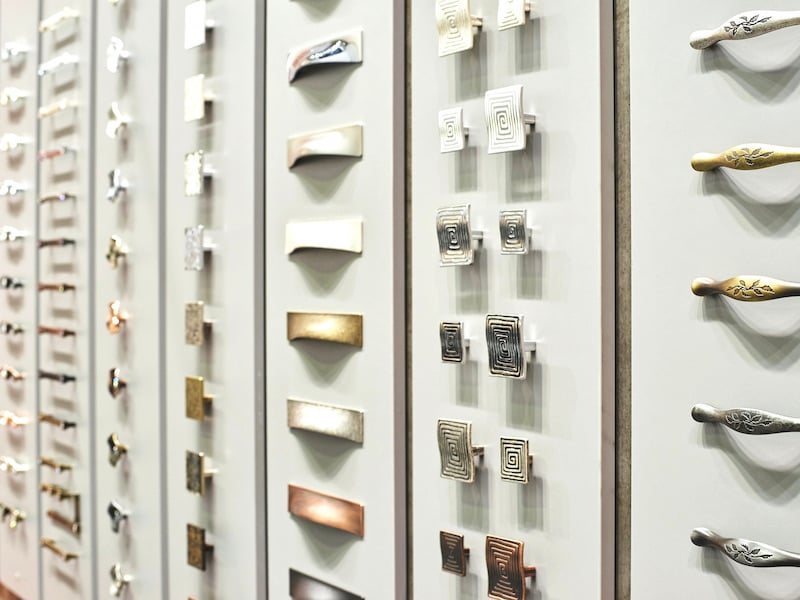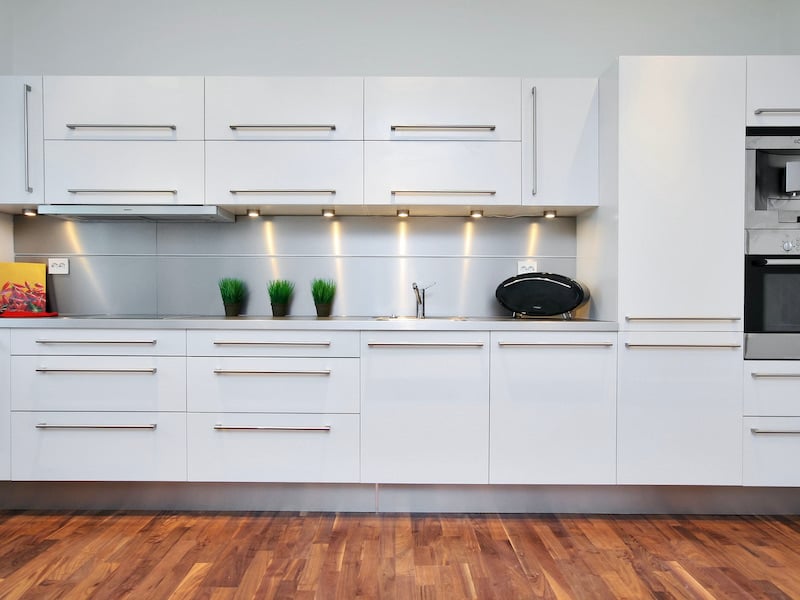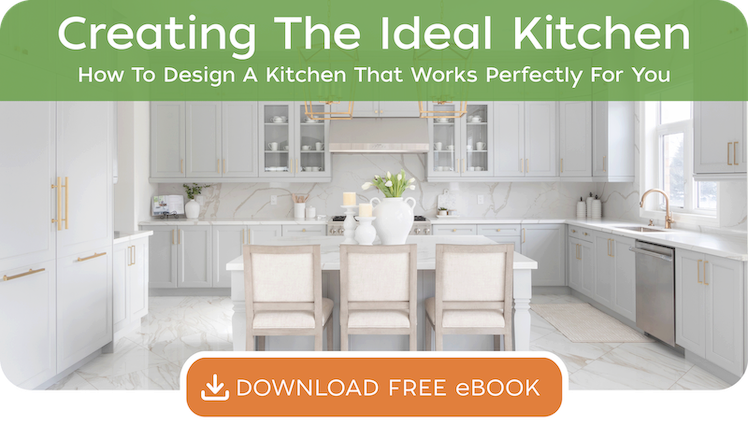A Designer's Guide To Selecting Finishing Touches That Elevate Your Kitchen
When building a custom home or remodeling your existing one, it’s easy to focus on the major kitchen selections — cabinetry, countertops, and flooring. Yet what truly brings the space together are the finer details. Cabinet hardware is one of those finishing touches that blends beauty with practicality, adding character and cohesion while reflecting your desired style.
Available in a wide range of types, sizes, materials, and finishes, decorative hardware offers endless opportunities to personalize your kitchen. The right combination will not only enhance the overall aesthetic but will also feel comfortable to use and function smoothly for everyday living. Our expert tips will help you select hardware that perfectly complements your kitchen and the way you live.

1. Types of Decorative Hardware
The first step in choosing kitchen hardware is deciding whether you prefer knobs, pulls, or a mix of both. Each option has its own look and feel. Knobs are smaller, classic, and easy to grasp, while pulls have a more linear, tailored appearance.
Whenever possible, handle sample pieces in person and hold them against your cabinetry. Notice how they feel in your hand, whether the scale is right, and if they coordinate with your cabinet style. Many homeowners choose to mix knobs and pulls for balance — for example, pulls on drawers and knobs on cabinet doors. For a cohesive result, choose one pull design and one coordinating knob design, and keep the finish consistent throughout the kitchen.
It’s also important to confirm availability of your selections. While some hardware can be delivered within days, custom or imported selections may require several weeks or more, so planning ahead will help your project stay on schedule.

2. Size and Positioning of Handles
Proper sizing and placement ensure that your hardware feels natural and looks proportional. Larger drawers and cabinet doors need substantial hardware for both visual balance and ease of use, while smaller pieces call for more delicate options.
As a general guideline, traditional or transitional pulls should be about one-third the width of the drawer front. Drawers wider than eighteen inches often benefit from two knobs or pulls for smoother functionality. In more contemporary spaces, longer pulls — about two-thirds the length of the drawer — create a sleek, streamlined effect.
Pulls are typically installed horizontally on drawers and vertically on doors, though modern kitchens sometimes feature horizontally placed pulls on doors for a minimalist look. Before installation, review placement details carefully with your homebuilder or remodeler to ensure every piece is aligned consistently. Attention to placement brings a sense of refinement and continuity that elevates the entire space.

3. Style of Hardware
After determining the size and placement of your hardware, the next step is selecting pieces that reflect the character of your kitchen. Whether your space has a contemporary, transitional, traditional, rustic, or eclectic sensibility, the hardware you choose will reinforce the design and unify the room’s visual aesthetic.
Contemporary
A contemporary kitchen is defined by simplicity, precision, and clean lines. The hardware should mirror these qualities with sleek profiles and minimal detailing. Slim bar pulls, tab-style handles, or curved designs in polished chrome, brushed nickel, or matte black all suit this streamlined look. These pieces highlight the cabinetry’s craftsmanship while maintaining a restrained, modern feel.
Because contemporary spaces typically feature flat-front cabinetry and integrated appliances, hardware becomes an important subtle accent. Selecting a finish that coordinates with surrounding elements — such as stainless steel appliances, modern fixtures, or metal lighting — helps create a cohesive, unified appearance. The result is a kitchen that feels sophisticated, functional, and quietly refined.
Our Guide To Choosing Kitchen Cabinets

Transitional
A transitional kitchen blends elements of both traditional and modern design, resulting in a look that feels timeless and harmonious. Hardware in this category often features simple forms with softened edges or gentle curves. Cup pulls paired with coordinating round knobs or slender handles in brushed nickel, chrome, or satin brass are classic choices that complement shaker or inset cabinetry.
This versatile approach works well in homes that bridge architectural styles. It allows for flexibility — hardware can lean slightly more modern or traditional depending on other finishes and details in the room. The goal is to achieve a cohesive, inviting space that feels both current and enduring.

Traditional
A traditional kitchen showcases fine craftsmanship, rich detailing, and timeless appeal. The cabinetry often features raised panels, decorative molding, or furniture-style design, all of which pair well with more ornate hardware. Drop handles, fluted knobs, and pieces with porcelain, glass, or crystal accents add refinement and complement the architectural character of the space.
Finishes such as polished brass, pewter, or antique bronze enhance the warmth and depth of traditional millwork. When thoughtfully selected, these details contribute to a sense of permanence and elegance that defines the traditional aesthetic.

Rustic
In a rustic kitchen, the focus is on warmth, texture, and the use of natural materials. Hardware should feel substantial and authentic, complementing the rich tones and organic patterns found in wood cabinetry and stone surfaces. Simple knobs or handles in oil-rubbed bronze, matte black, or weathered copper are ideal choices, adding contrast while offering a comfortable, unpretentious look.
These finishes often develop a soft patina over time, enhancing their appeal and reinforcing the welcoming, timeworn character of the space. The result is a kitchen that feels relaxed and full of personality.

Eclectic
An eclectic design approach allows for creativity and individuality. This style combines different elements, finishes, and forms to create a look that feels personal and layered. Hardware becomes an opportunity to introduce color, texture, or an unexpected shape — elements that make the kitchen uniquely your own.
Hand-painted ceramic knobs, sculptural pulls, or vintage-inspired pieces can serve as focal points when paired with simpler cabinetry. Mixing materials or finishes works best when done intentionally, with one unifying element — such as color, scale, or silhouette — tying the design together. The result is a collected, distinctive space that reflects your personality without feeling mismatched.

4. Materials
Cabinet hardware is made from a range of materials, each chosen for its appearance, weight, and durability. The material you select should complement your kitchen’s overall look while performing well in everyday use.
Brass is a timeless choice that combines durability with natural warmth. Its antimicrobial properties and resistance to corrosion make it as practical as it is elegant. Bronze offers a more substantial feel and gradually develops a patina, adding depth and character that suit traditional or rustic kitchens. Stainless steel delivers a sleek, modern appearance and exceptional durability, ideal for high-use areas or contemporary designs.
Nickel and pewter feature more muted tones that create a refined, understated effect, pairing beautifully with transitional cabinetry. For decorative appeal, glass, crystal, or ceramic hardware adds light, texture, and personality — perfect for vintage-inspired or eclectic spaces.
When choosing a material, consider how it will wear over time and how its tactile quality contributes to the overall experience of using your kitchen every day.

5. Finishes
The finish you select determines the look of your hardware and helps set the tone for your kitchen. From polished to matte, brushed to antiqued, each finish interacts with light differently and can subtly influence the overall design.
Polished stainless steel or chrome adds brightness and a crisp, modern edge, while brushed or satin finishes offer a softer, more forgiving surface. Warm-toned metals such as pewter, aged brass, and oil-rubbed bronze bring richness and depth, developing character as they age. For bold contrast, matte black creates a striking, contemporary statement, particularly against lighter cabinetry.
Whatever direction you take, aim for consistency. Coordinating hardware finishes with faucets, lighting, and appliances creates a cohesive look and reinforces the style of the space. A well-chosen finish not only enhances the material beneath it but also completes the design with subtle sophistication.

At Meridian Homes, we specialize in luxury remodeling and custom home building in the Washington, DC area. Our mission is to create exceptional residences that exceed expectations. Our highly personalized design process and careful management of every project have earned us a reputation over many years for outstanding client service and solid, beautiful craftsmanship. Contact us today to begin your custom home or remodeling project.




